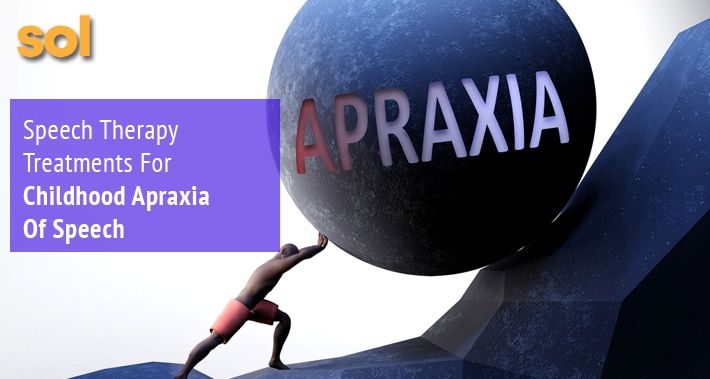
Childhood apraxia of speech is a sound disorder that occurs when your child’s brain struggles to coordinate speech movements.
It’s not a muscle weakness and works very differently compared to other speech sound disorders like an articulation disorder or dysarthria.
RELATED : Understanding The Different Types of Speech Sound Disorders
Your child’s brain has to learn how to send the correct signals which direct their lips, jaw, and tongue during speech to create accurate sounds and words.
Speech therapy for speech sound disorders like childhood apraxia of speech can be a highly effective solution for this disorder.
Your speech therapist will break down the correct way to say words, syllables, and phrases so that your child can improve.
Here at Sol Speech And Language Therapy, we can help.
But first, let’s talk more about how childhood apraxia of speech works and how a pediatric speech therapist can help.
What Is Childhood Apraxia Of Speech?
Childhood apraxia of speech is a rare speech sound disorder where your child has difficulty making accurate movements while speaking.
Often, they know exactly what they want to say, but the challenge arises when their brain sends the signals to move their mouth and related speech muscles.
Their muscles don’t perform normally because their brain is struggling to direct and coordinate the speech movements.
What Are The Symptoms Of Childhood Apraxia Of Speech?
There are a variety of speech characteristics, or symptoms that your child may have if they have childhood apraxia of speech.
These will vary depending on their age and the severity of their speech challenge.
If your child is between 18 months and 2 years, your child may have childhood apraxia of speech if you notice your child:
- Has a delayed onset of first words
- Knows only a limited number of spoken words for their age
- Is only able to form a few consonant or vowel sounds
If your child is between 2 and 4 years old, the symptoms of childhood apraxia of speech you may notice include:
- Separation of syllables in or between words
- Voicing errors like the word ‘pie’ sounding like ‘bye’
- Vowel and consonant distortions
- Saying the same word different ways each time
- Saying shorter words clearer than longer words
Typically, children with childhood apraxia of speech have a hard time getting their jaw, tongue, and lips to move to the correct positions to make a sound.
In the end, it is a motor sequencing issue.
Transitions between sounds are also a challenge, which is why they may say shorter words clearer than longer words.
It is not unusual that you may notice your child has a reduced vocabulary or difficulty with sentence word order.
In some cases, childhood apraxia of speech can lead to issues with fluency, causing issues like stuttering or cluttering.
As a result, those who seek treatment for childhood apraxia of speech often end up seeking out speech therapy for stuttering as well.
If you notice your child has any of these symptoms, it’s a good idea to book an assessment with a speech therapy clinic.
What Causes Childhood Apraxia Of Speech?
There are a number of possible causes for childhood apraxia of speech.
However, it’s often the case that a specific cause can’t be determined.
This speech disorder can sometimes be the result of a brain condition or injury such as a stroke, infection, or traumatic brain injury.
Of course, strokes are, thankfully, extremely rare in children.
Childhood apraxia of speech can also manifest as a symptom of a genetic disorder or metabolic condition.
While it can also be referred to as developmental apraxia, children with this disorder don’t necessarily grow out of it.
Speech therapy is often required to maximize their development.

How Is Childhood Apraxia Of Speech Diagnosed?
The goal with childhood apraxia of speech, as is the case with most childhood speech disorders, is to diagnose it early and start speech therapy in order to reduce the risk of long term persistence of the problem.
You should be familiar with general speech development milestones your child is expected to reach in order to monitor their progress.
If you notice your child has any persistent speech problems, it’s a good idea to have them evaluated by a speech therapist for this reason.
The first thing your speech therapist will do is a speech and language evaluation on your child.
Your speech therapist will look at your child’s oral motor skills, speech melody (intonation), and how they say different sound combinations in order to test for childhood apraxia of speech.
This includes checking how well your child says speech sounds alone, as well as combined in syllables or words.
How Can A Speech Therapist Help?
Studies have shown that speech therapy can improve speech production and the accuracy of connected speech.
Once your child’s speech therapist confirms that childhood apraxia of speech is present, they will create a treatment plan.
This plan will be designed to teach your child how to sequence the movements needed to say correct sounds and how to make those movements correctly.
They will also focus on timing to teach your child how to make those movements at the correct time.
The key area of focus is practicing the movements and teaching your child how to use their oral muscles.
Much like going to the gym, but for your mouth.
Speech drills using all your child’s senses are often a great resource many speech therapists will include in their program.
This will help your child retain more information.
Some things they might use are:
- Touch cues, like touching their lips when say the ‘p’ sound so they remember to close their lips
- Visual cues, like using a mirror to watch when making sounds
- Listening cues, like practicing with voice recordings and listening back to them to hear if the sounds were made correctly
Your speech therapist is a great resource to help your child improve their speaking and communication.
They can also answer any questions you have about their process and clearing up myths around speech therapy in general.
Mindfulness With Apraxia Of Speech
There is limited but growing evidence that incorporating mindfulness into speech therapy may benefit children with apraxia of speech.
Through mindfulness and meditation, children can become more aware of the mind – body connection they may be struggling with, which can help bridge the gap between your child’s brain and their speech muscles.
As well, mindfulness that incorporates chanting or mantras can help them with getting used to making the sounds they may be struggling with.
At Sol Speech And Language Therapy, we incorporate mindfulness into our science based speech therapy practice where it makes sense.
By combining mindfulness with more traditional treatments for childhood apraxia of speech, we work to get your child the best results in treating their speech disorder, which can also reduce any anxiety they may be feeling due to their speech challenges.
Mindfulness will also teach them new coping strategies that can help them with future challenges.
Book Your Appointment With Sol Speech And Language Therapy Today
Speech therapy is a great resource to help with childhood apraxia of speech.
The earlier your child is able to start speech therapy, the greater the chances for success.
This is because there will have been less time for bad speech habits to become ingrained.
Remember, this disorder doesn’t necessarily dissipate as your child develops.
To get started with Sol Speech & Language Therapy, schedule an evaluation at any one of our clinics today.
We have a warm and welcoming speech therapy space to help your child relax and enjoy their treatments.
We can also accommodate remote appointments with speech teletherapy services depending on your family’s needs.
We’re excited to work with you and your child.
Book your appointment with Sol Speech And Language Therapy today.
6448 E Hwy 290 Suite E-108,
Austin, TX 78723
(512) 368-9488
» https://g.page/r/CfRfhOpEQm7BEAE
Sol Speech & Language Therapy
555 Round Rock W Dr E-221,
Round Rock, TX 78681
(512) 808-3953
» https://g.page/r/Cb5pwCTosSEfEBM
Sol Speech & Language Therapy offers personalized skilled intervention to those struggling with their speech and language skills. Services offered include screening, consultation, and comprehensive evaluation. We also provide one-on-one and/or group therapy for speech sound disorders, receptive/expressive language delay/disorder, stuttering/cluttering, accent reduction, and much more.